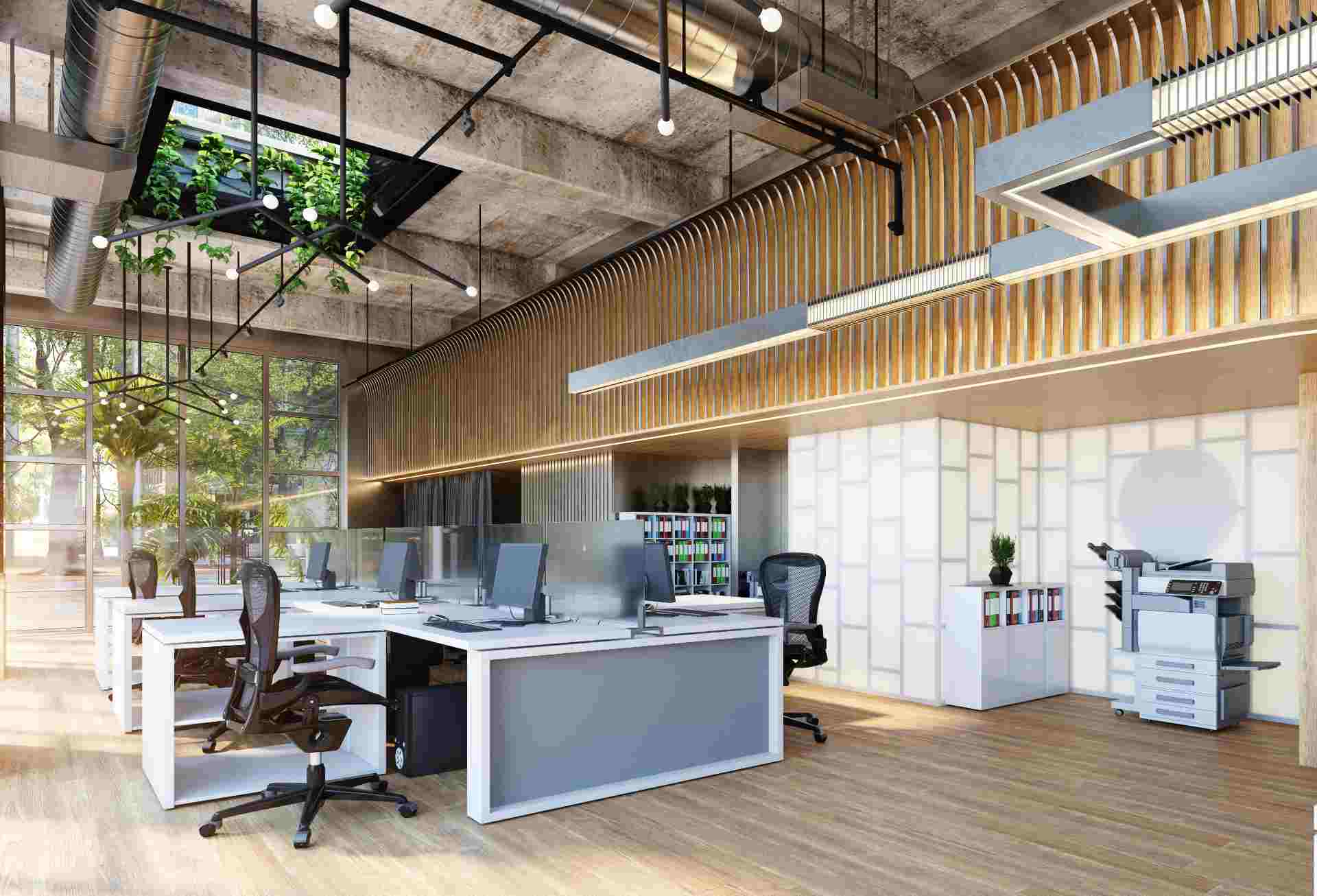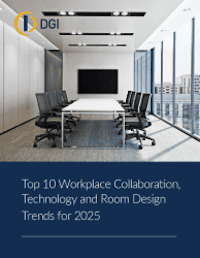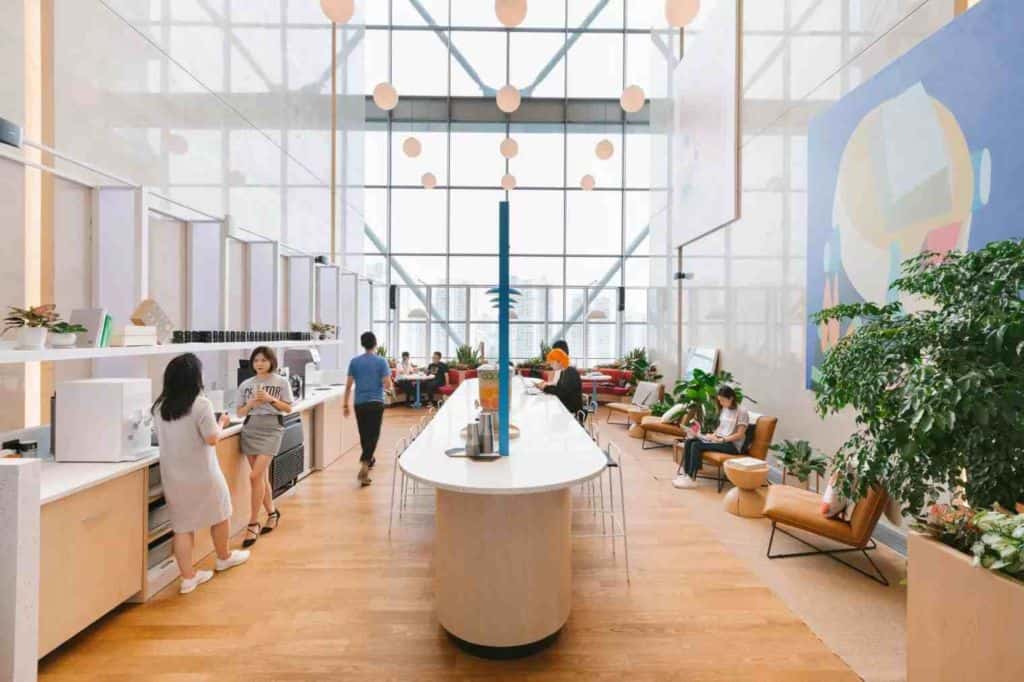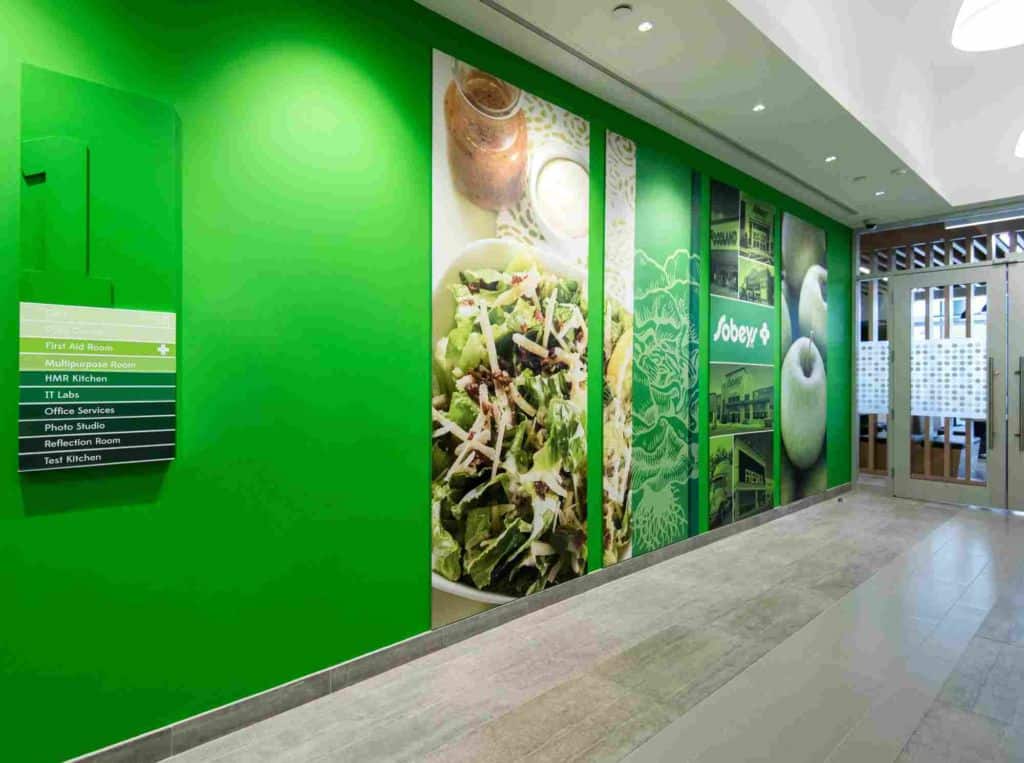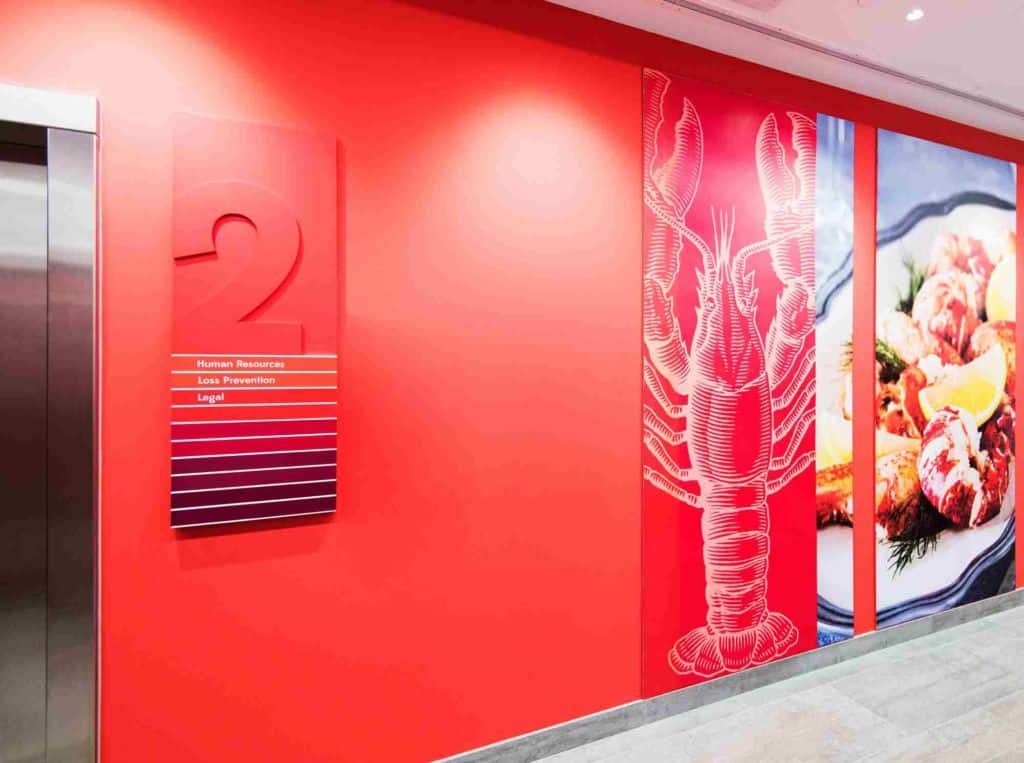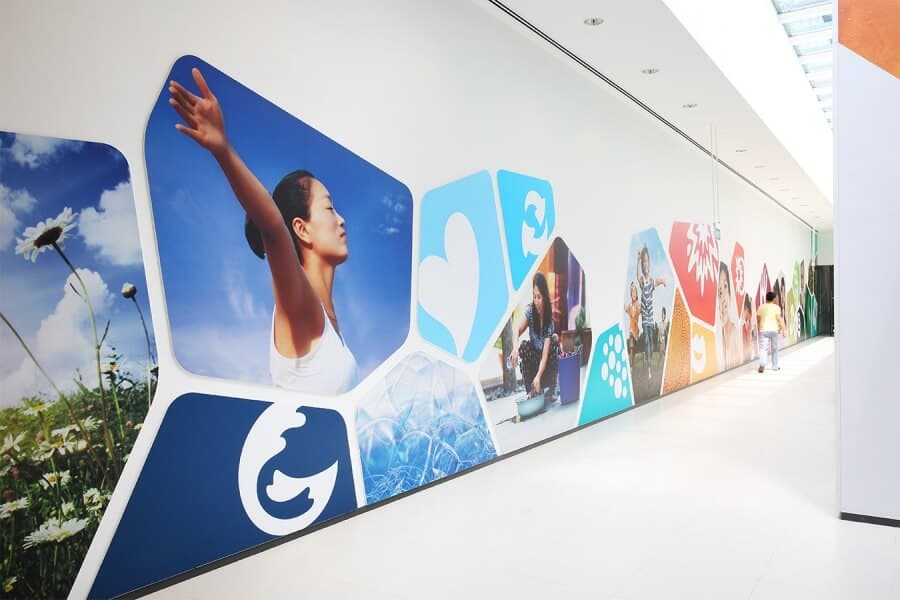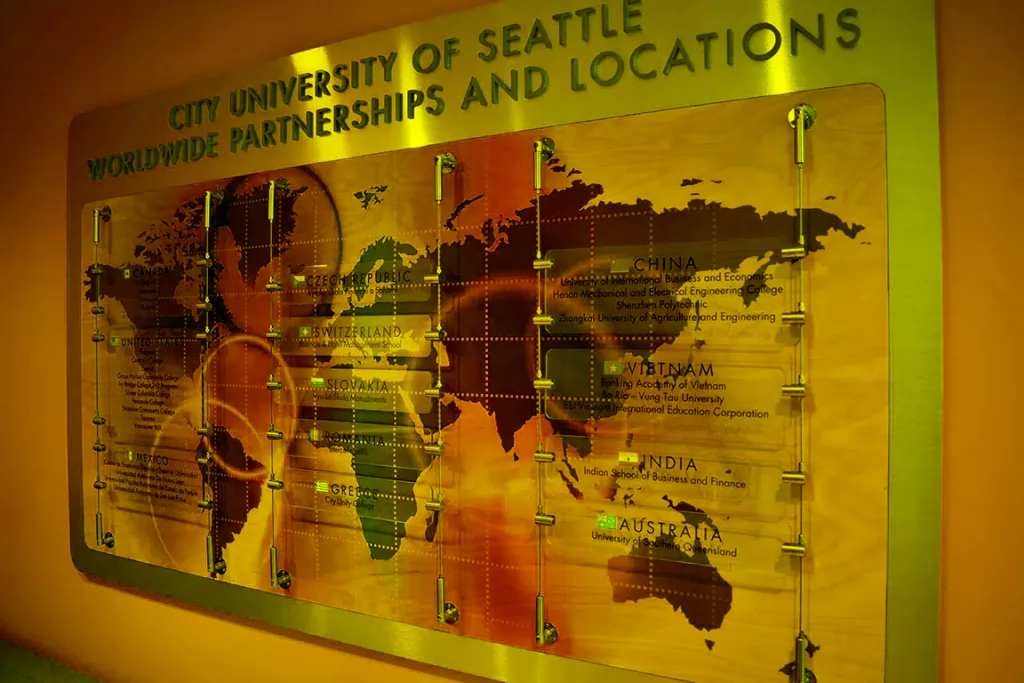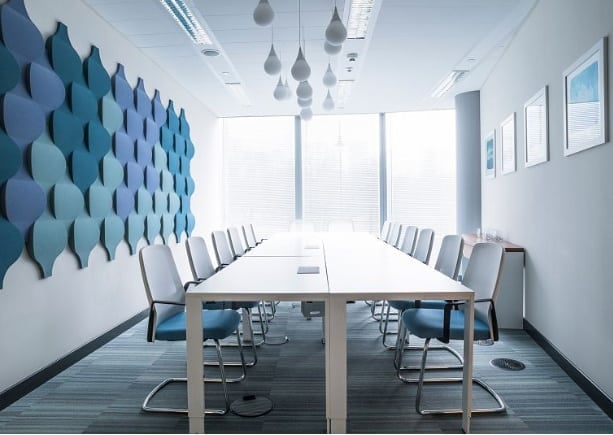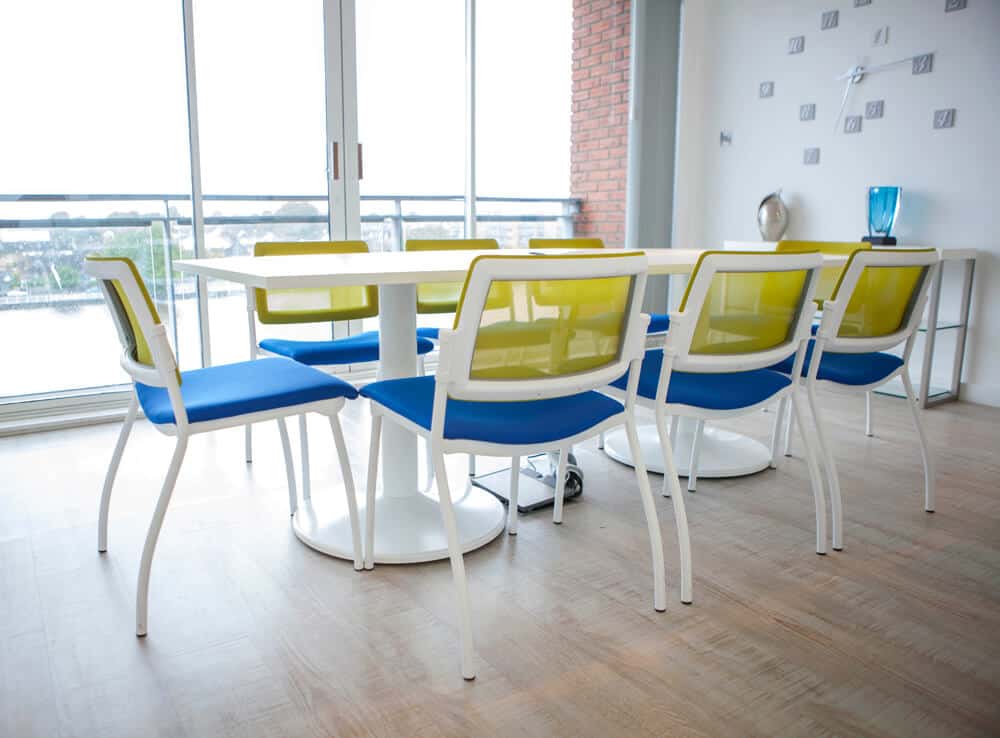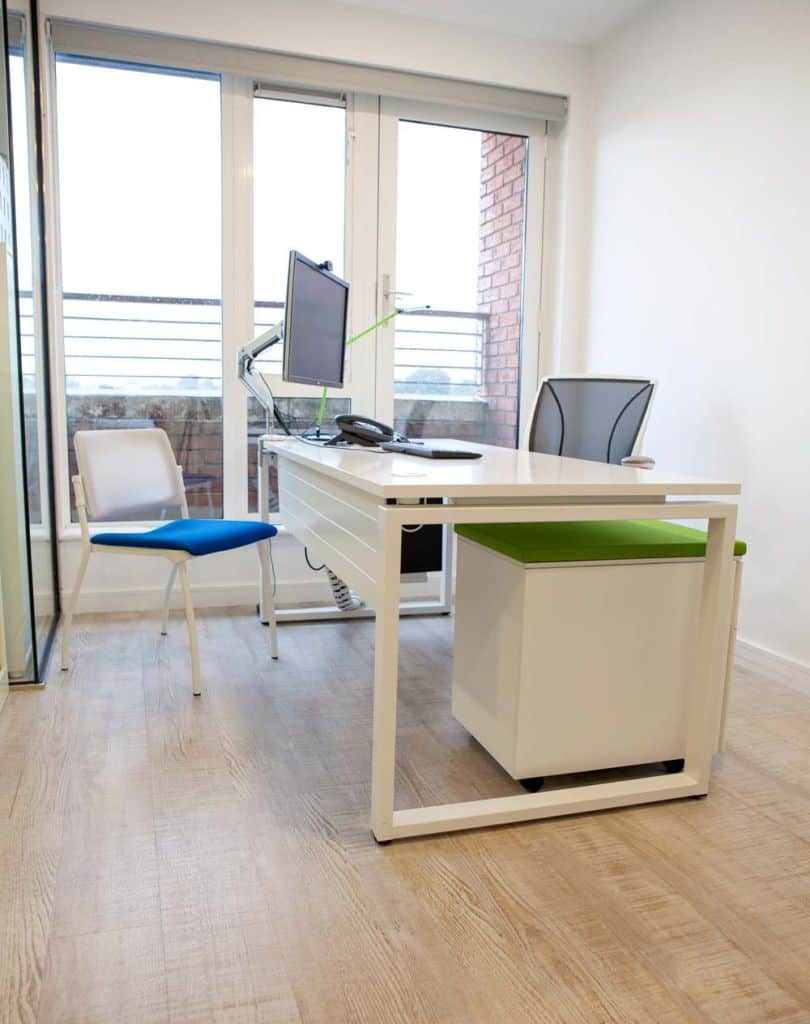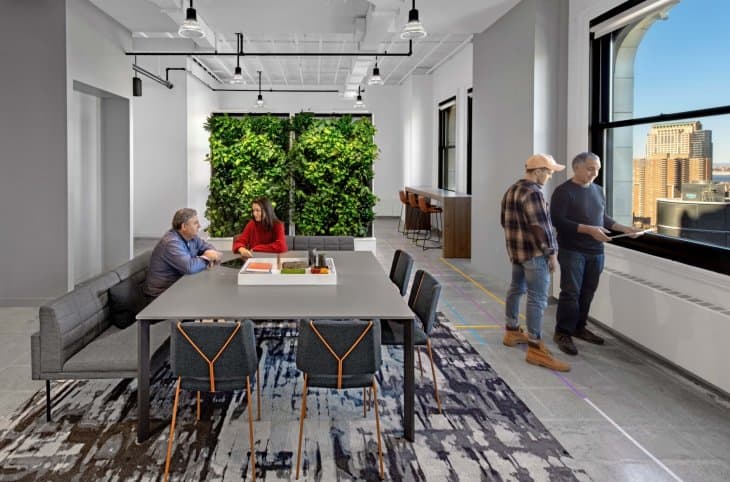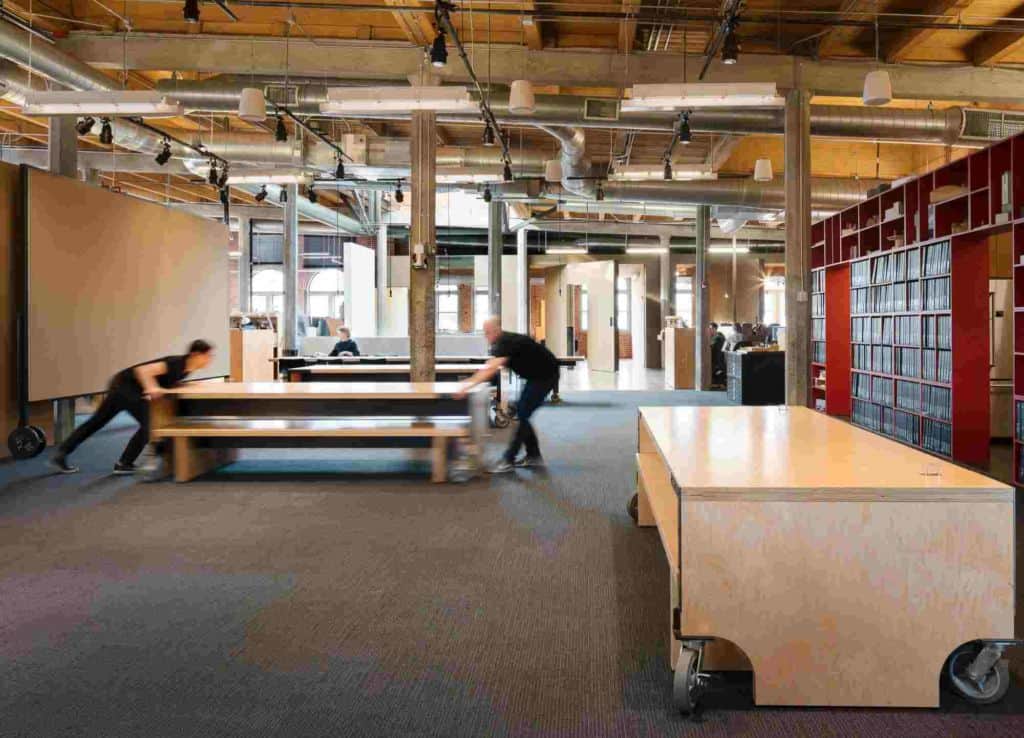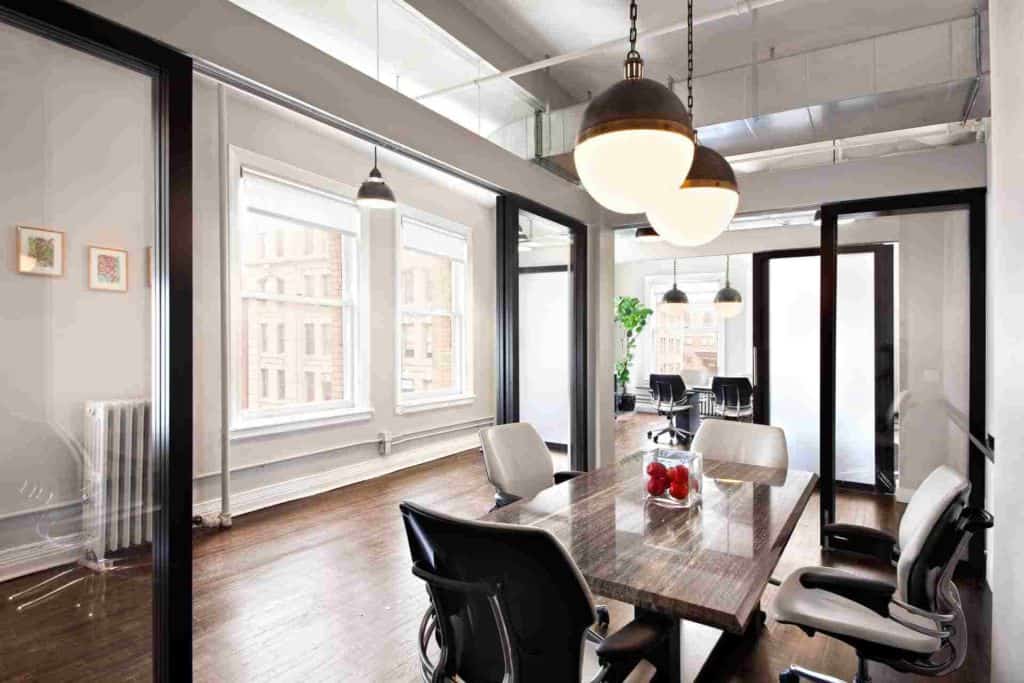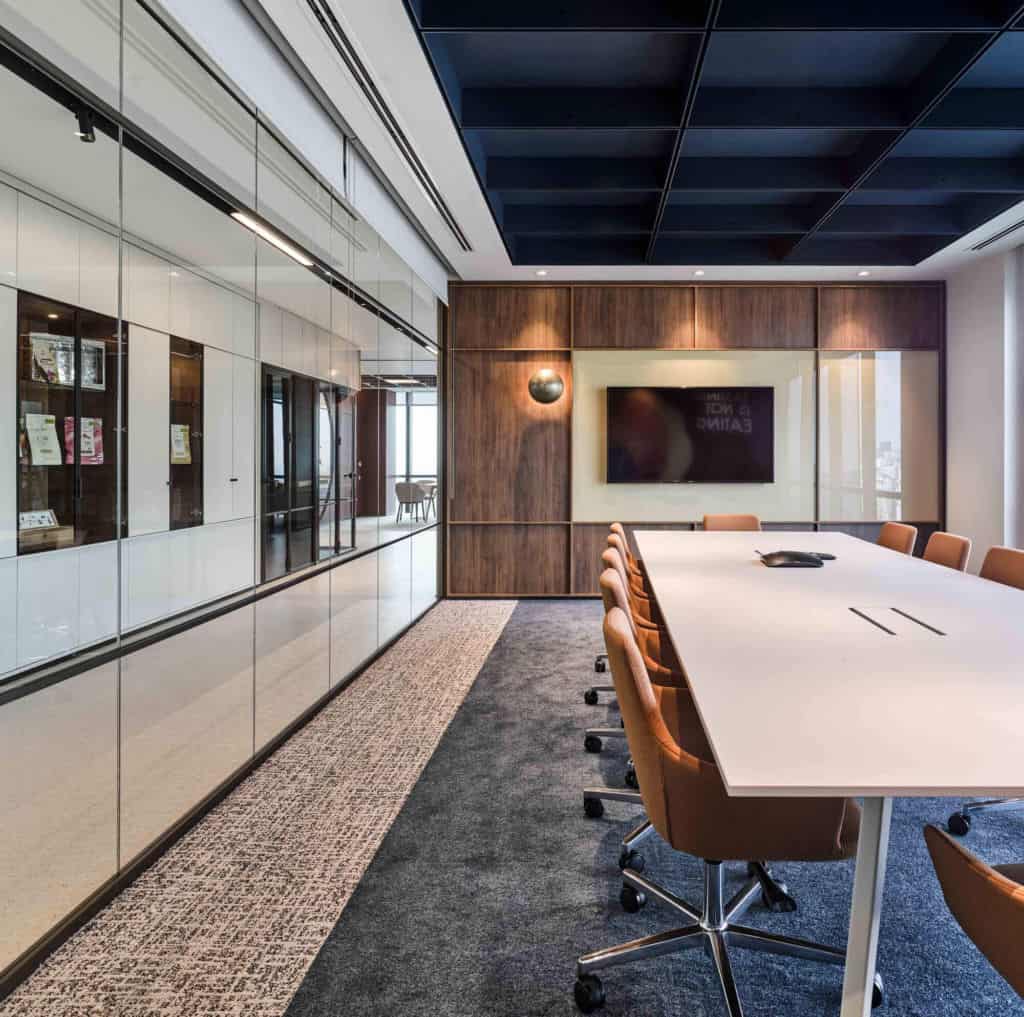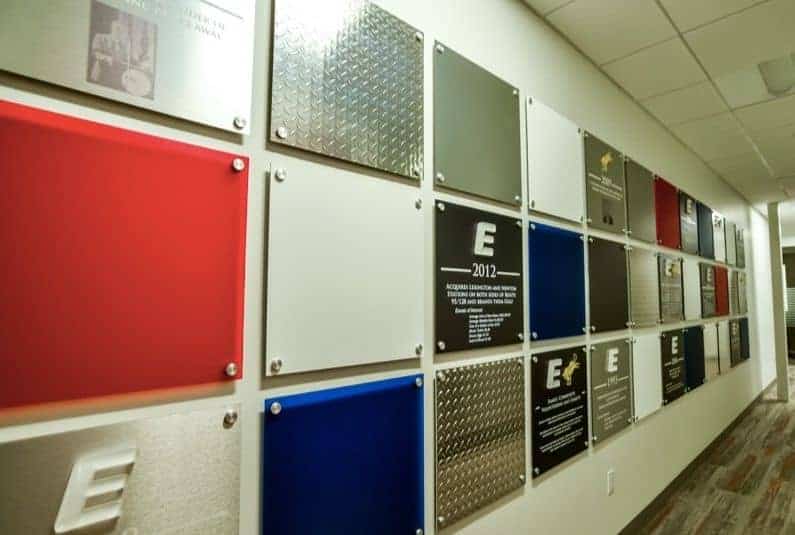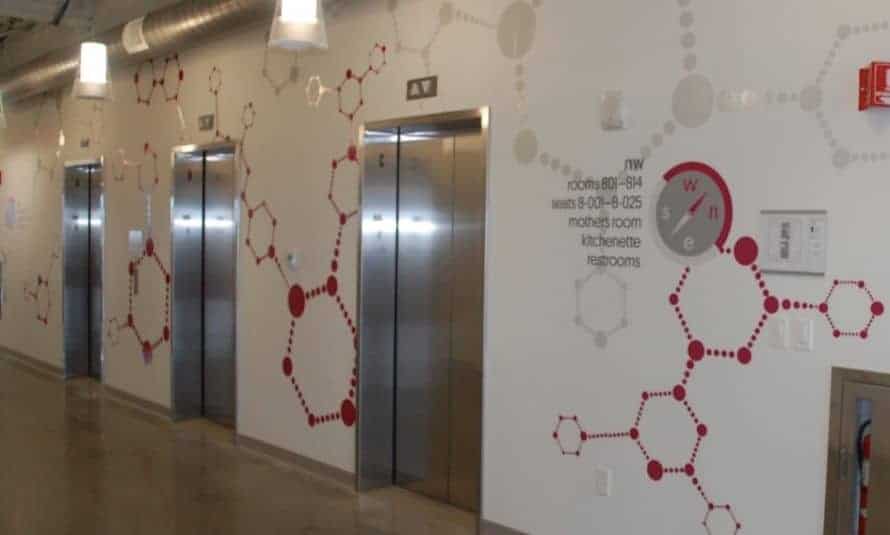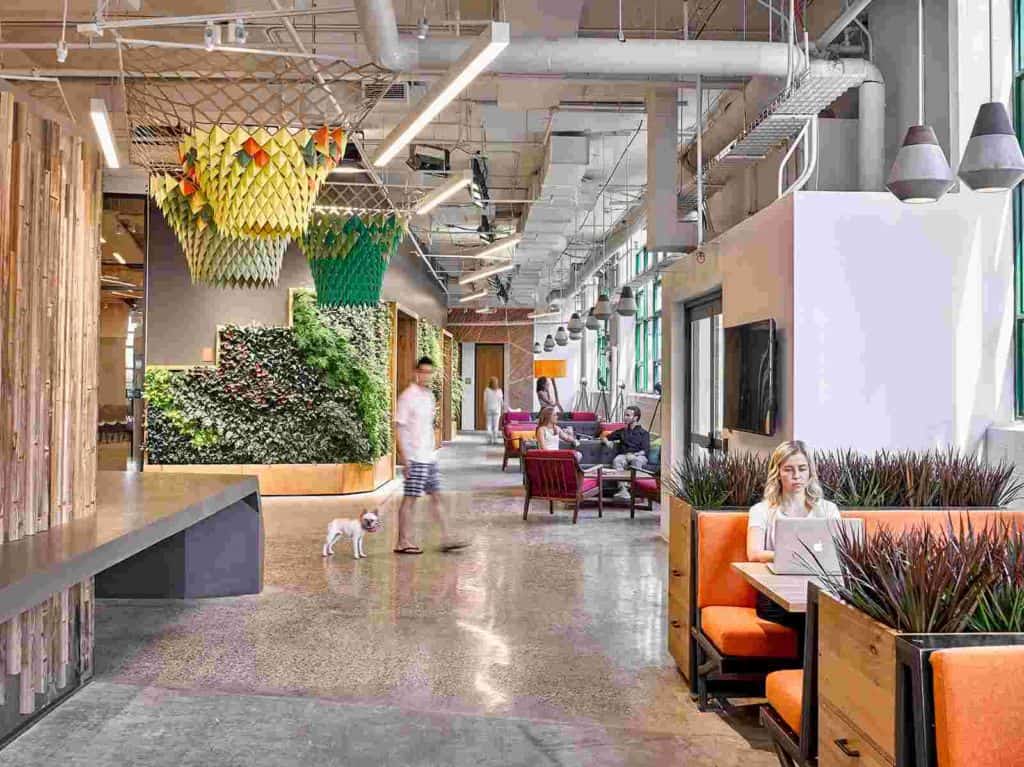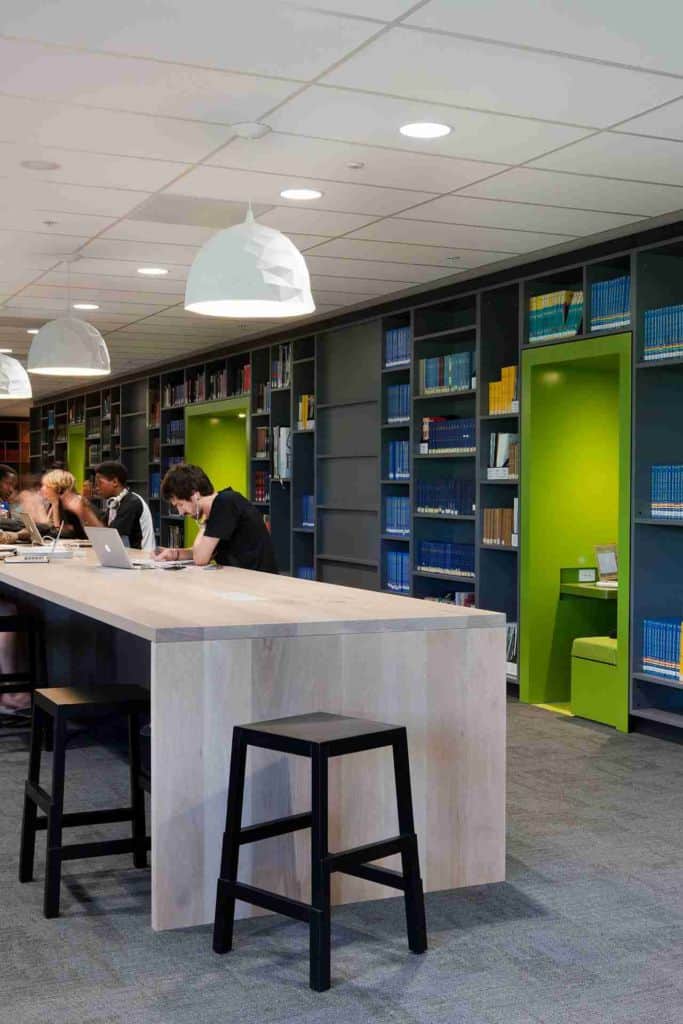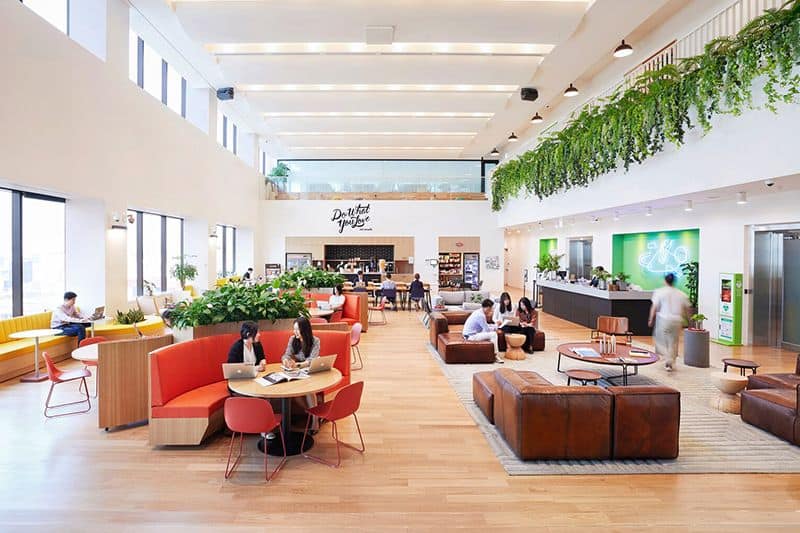Modern office design goes hand-in-hand with modern workplace culture. Creativity, collaboration and productivity thrive when employees are comfortable in their space. As more companies shift toward remote and hybrid work, the traditional cubicle maze setup is vanishing, making way for multi-purpose common areas, a focus on incorporating natural elements, creative use of wall space and more.
The best office interior design is the one that’s right for your organization. It can be challenging to spot the trends that balance passing fads and evergreen design. We’re here to help with this guide to workplace interior design.
Common Area Design Ideas
Since nine out of 10 businesses are combining in-person and remote work
as the new norm, common areas are necessary spaces. Common areas can include break rooms, kitchens, open work areas and more. Great office common space design reflects how your company does business and what your teams need to accomplish their goals.
A large space dotted with love seats and coffee tables works for impromptu brainstorming, quiet contemplation and study, but maybe not for lunch meetings and round-table creative sessions. A big round table, or lines of counters can give employees great spots to relax over lunch or have a spirited discussion, but they’re not great for long work stretches at the computer. The key is striking the right balance and offering your workforce different kinds of common spaces to suit the needs of their workday.
To expand on this idea, think about booths and nooks that offer privacy, but not isolation from the rest of the team. Flexible common spaces facilitate spontaneity and collaboration—the aha! moment—not easily replicated in structured, conference room-style meeting spaces.
Creating a connection between the conference room and common areas is an intriguing modern office design trend. We love the idea of using glass and acoustic management to keep the conference room private, but also flooded with light and open to the higher energy of the common areas around it.
Designating Space with Color
Color psychology studies how color affects human emotions and behaviors. Consider how, in Western cultures, red tones often imply a warning, or strong emotions such as excitement or anger. Conversely, in some Eastern cultures, red is the color of joy or luck. Depending on one’s upbringing, cultural background and personal experiences, color can influence states of mind as well as actions.
Think strategically about color and how you want to affect your team. Bolder colors may inspire excitement, while calmer tones may create a more serene environment. It’s in your best interest to choose colors that resonate with your company’s brand colors and mission.
Utilize Wall Murals & Environmental Graphics
No one wants to look at boring walls. Wall space presents a perfect opportunity to display who your company and its employees are and what you believe in. For example, a wall mural can tie your area’s natural beauty to your company culture.
Environmental Graphics:
- Motivate, inspire, connect employees + encourage cooperation and well-being
- Reinforce brand identity and corporate messaging
- Can bring dimension to your space framed art, standoff wall panels, dimensional and lit logos and lettering or column wraps
- Create a unique and unified visual environment
- Offer privacy on glass walls and partition
- Combine acoustic management panels with color, form and texture
Consider Sound Quality & Sound Masking
The sound quality in your office space is also crucial to your company’s workplace environment. No one enjoys loud ambient noise, be it from the world outside or the everyday dissonance of technology and conversation. Privacy often depends on well-managed acoustics as much as thoughtful organization of your physical space.
There is a wide array of products, from simple custom-colored panels to beautiful architectural elements that mask or dampen sound to create a calm, productive space for your teams to relax and focus on their work.
Sound improvement is a must-have for productive settings. While the right design choices can decrease employee distraction and improve focus, sound masking systems and acoustic panels enhance your corporate office interior design by managing noise levels or absorbing sound, creating a quieter workplace. Whether you are brainstorming office space design ideas or rejuvenating your office interior design, the addition of sound management is key.
Here’s a curated list of products that can enhance sound quality and add style to office interior decorating:
- Acoustic Panels: These highly customizable sound absorption solutions come in eco-friendly options, offering a wide range of design features from color and graphics to unique architectural installations.
- White Noise Machines: White noise machines help mask high ambient noise levels in open spaces.
- Acoustic Dividers: Acoustic dividers create partitions in a large open space while enhancing privacy and lowering ambient noise levels.
- Ceiling Baffles: These architectural sound management solutions absorb sound and can add a stylish flair to high-ceilinged spaces.
- Soundproof Curtains: An easy remedy for any office environment with exterior windows or walls and a noisy outside environment, these curtains help to control ambient noise.
By integrating these sound management solutions, you can create a productive and aesthetically pleasing environment that enhances your office interior design.
Incorporate Natural Lighting
We understand it’s not always possible to use natural light — but if you can, you should. Humans crave natural light and outdoor views and incorporating natural light can help reduce energy spending. Studies show that natural light in the workplace makes employees feel better rested and more positive.
Here are a few tips to incorporate natural lighting into any office space:
- Use smart glass panels that adjust from transparent to opaque with the touch of a button or app instead of interior walls. This allows natural light to brighten an office space.
- Keep the lines of your furniture and storage options clean and minimalist to allow natural light to reach every inch of your space.
- To give employees and guests privacy, consider partitions and architectural accents instead of walls.
- Use reflective surfaces to maximize the impact of your natural light. Gloss finishes, mirrors and lighter colors all boost light.
Use Natural Elements
Bringing elements of nature into your office helps your workforce feel connected to the world beyond your four walls. Integrating flowers, container gardens, succulents and living walls can not only improve morale, but plants are also fantastic natural air quality monitors. It’s also beneficial to incorporate natural materials, such as wood, brick and stone in your architecture and design to mimic the feel of an outdoor setting.
Consider installing a waterfall or fountain for the cool, refreshing sound of flowing water. Water features can work in tandem with living walls and container gardens to double the impact. While water features don’t always require a huge amount of space, they do require some forethought for plumbing and proper construction.
Bringing natural elements into office interior design fosters balance and relaxation—great ways to achieve a welcoming workspace. Planting indoor trees, for instance, helps clean the air and makes the corporate office space livelier (though they do require regular care).
Indoor plants in the reception area create a friendly and inviting corporate office environment. Wooden furniture brings comfort and warmth to modern interior office design, and large windows provide natural light, boosting the serotonin of the occupants.
Here are some office space design ideas to try:
- Indoor plants – Boost energy and creativity.
- Wooden desks and shelves – Bring nature indoors.
- Water features – Offer soothing sounds for a peaceful interior office space.
These simple touches can transform your office interior decorating.
Open Floor Plans
Wide open floor plans are a common theme when you’re designing a modern office space. Think about reconfiguring workstations to offer both private and public areas that transition seamlessly to allow employees to experience the environment that supports the work they do as they’re doing it.
Open floor plans have become popular in office space layouts, although they provide some advantages and disadvantages. They engender a space that can be both spacious and collaborative, which is excellent for facilitating teamwork in corporate office interiors. However, this can be at the expense of privacy and the ability to focus on individual tasks.
Pros of Open Floor Plans:
- Enhanced Collaboration: Open plans tend to boost communication; therefore, they are more suitable for teams working closely with each other.
- Flexible Layout: You can quickly move the furniture to try out a new office space design.
- Cost-Effective: Fewer interior walls to build can reduce building costs, allowing you more room in your budget.
Cons of Open Floor Plans:
- Noise Levels: Noise is a significant distraction factor.
- Lack of Privacy: Employees do not have privacy within an open space and might need or prefer quiet spaces, depending on their assignment.
- Visual Clutter: Open spaces may look disorganized without an excellent interior decorating office.
Remember, some employees may be in the office every day, while others may only be in once a week or once a month. So, while not every employee will have a dedicated desk, they should have a designated space to work from. A hotdesking strategy can help mitigate this challenge.
Fluid Workspaces
Sometimes an office space suffers because no one quite knows how to utilize it. Knowing in advance how you want your space to function can help you make the right design choices the first time. A smattering of tables and chairs does not always make a welcoming space. The fluid workspace areas usually support both working and socializing.
Fluid workspaces can be a cornerstone of a contemporary office interior design that prioritizes mobility and adaptability. Some features you should consider incorporating include:
1. Modular Desks –Allow for creative, task-specific office design layouts.
2. Mobile Whiteboards – Encourage brainstorming and quick note-taking anywhere in the office.
3. Foldable Chairs and Tables – Ideal for multi-purpose areas transitioning from meetings to social spaces.
4. Adjustable Standing Desks – Support different working preferences and promote healthy posture.
5. Acoustic Partitions – Provide privacy and flexibility as needed, without permanent walls.
With these versatile office interior decorating options, you can create an adaptable workspace that promotes productivity and comfort.
The common area at Olson Kundig serves as flexible meeting and event spaces, social gatherings, and breakout collaboration space.
Sliding Doors
Sliding doors are a great way to create transitions between public and private areas without taking up too much space. There are many options for material, size and hardware/function, from semi-permanent installations to rustic barn door styles.
Wimberly Interiors has a space that is great for impromptu collaboration, but can be made more private with sliding glass doors.
Lounge Comfort Areas
From foosball to beer on tap, some companies are known for their legendary perks. Not every organization prioritizes this level of downtime, but there are a few amenities no company should skimp on.
Comfortable lounge areas are a vital part of modern office interior design, offering employees a place to relax, recharge, or collaborate informally. These spaces can go beyond the typical kitchen breakroom and contribute to a more inviting workplace environment.
Here are some office space design ideas to create cozy and functional lounge areas:
1. Soft Seating: Incorporating plush sofas and armchairs into your corporate interior office design allows employees to relax or have casual meetings.
2. Reading Nooks: Set up cozy corners with bookshelves and comfortable chairs to encourage quiet time away from desks.
3. Game Zones: Add ping-pong tables or video game consoles for stress relief, turning a lounge section into a fun area.
4. Cafe-Style Seating: Offer café tables and stools, mimicking the feel of a coffee shop within your interior design office. This setup is great for quick breaks or casual work sessions.
5. Indoor Plants: Greenery adds a calming touch to office interior decorating and improves air quality, making lounges more inviting.
We think every workplace space needs a basic kitchen space with hot and cold beverage options. It can be as simple as an appropriately scaled coffee and tea service and a water cooler, or as complicated as an espresso bar and a fridge stocked with juices, seltzers and fresh fruit.
Quality Conference Rooms
Conference rooms are arguably one of the most important spaces in an office. Employees, stakeholders and clients alike congregate in conference rooms. A strategically designed conference room can create an inviting and productive environment. Simple video and audio upgrades can make video conferencing with remote employees more productive. You can even implement LED video walls and interactive whiteboards for zoom calls and collaboration.
The conference room at Barry Callebaut Offices & Chocolate Academy has clean lines and modern technology, making it a great meeting space for employees and clients alike.
The Best Office Interior Design Examples
bluebird bio – bluebird bio used environmental graphics to create a unique wayfinding system through their office.
Etsy Brooklyn Headquarters – Etsy’s office features a fresh and funky common space that’s on brand without showcasing the logo (check out those unique light fixtures). Industrial elements mix with live greenery, natural wood accents and pet-friendly floor surfaces for a casual feel. Natural light and a mix of seating areas facilitate all kinds of work and conversation.
Raheen Library at Australian Catholic University – Bold colors and clean lines offer a vibrant, productive common area with a casual approach to workspaces and a place for conversation and collaboration.
WeWork Yeouido Station – The main lounge is casual, professional and welcoming with pops of color that give the space character. It has specific areas for conversation (sofas) and breakout collaboration (booths) in addition to small and long, multifunctional tables. Airy and light, this space is augmented with invigorating live greenery.
FAQs
Q: How to design an office interior?
A: Designing an office interior is not something you should handle without a plan or on your own. Start by considering space and needs, now and going forward. You may want to consider existing team dynamics and how you see the space facilitating team functionality in future. Will you need spaces for collaborative efforts, for the individuals to concentrate, and a separate space for relaxation? DGI’s professional design team can help coordinate the right plan for your organization.
Q: What are the different trends you can use in your office interior designs?
A: Current trends in office interior design include biophilic design, which incorporates natural elements. Sustainable materials and eco-friendly furnishings are also popular. Open floor plans encourage collaboration, while designated quiet zones help with focus. Flexibility in furniture design allows for easy reconfiguration and adapting to team needs.
Q: What are the best textures and patterns to use in your office interior designs?
A: Use soft fabrics and sleek surfaces to create a balance when discussing textures and patterns. Incorporate texture through wallpaper or fabric panels to give the walls depth. Varying materials like wood, metal, and glass, make the atmosphere dynamic. An alternative idea can be to spruce up the office with the help of potted plants to sit inside offices that will transform the space being designed.
These strategies can elevate your corporate office interior design and improve employee satisfaction. Remember, office interior decorating is about creating a space that reflects your brand while fostering productivity.
Get Started Today
With broad expertise across a wide spectrum of industries, we are equipped to assist at the start of a new project or update existing spaces. DGI’s experts offer the solutions you need to bring your modern office design ideas to life.
